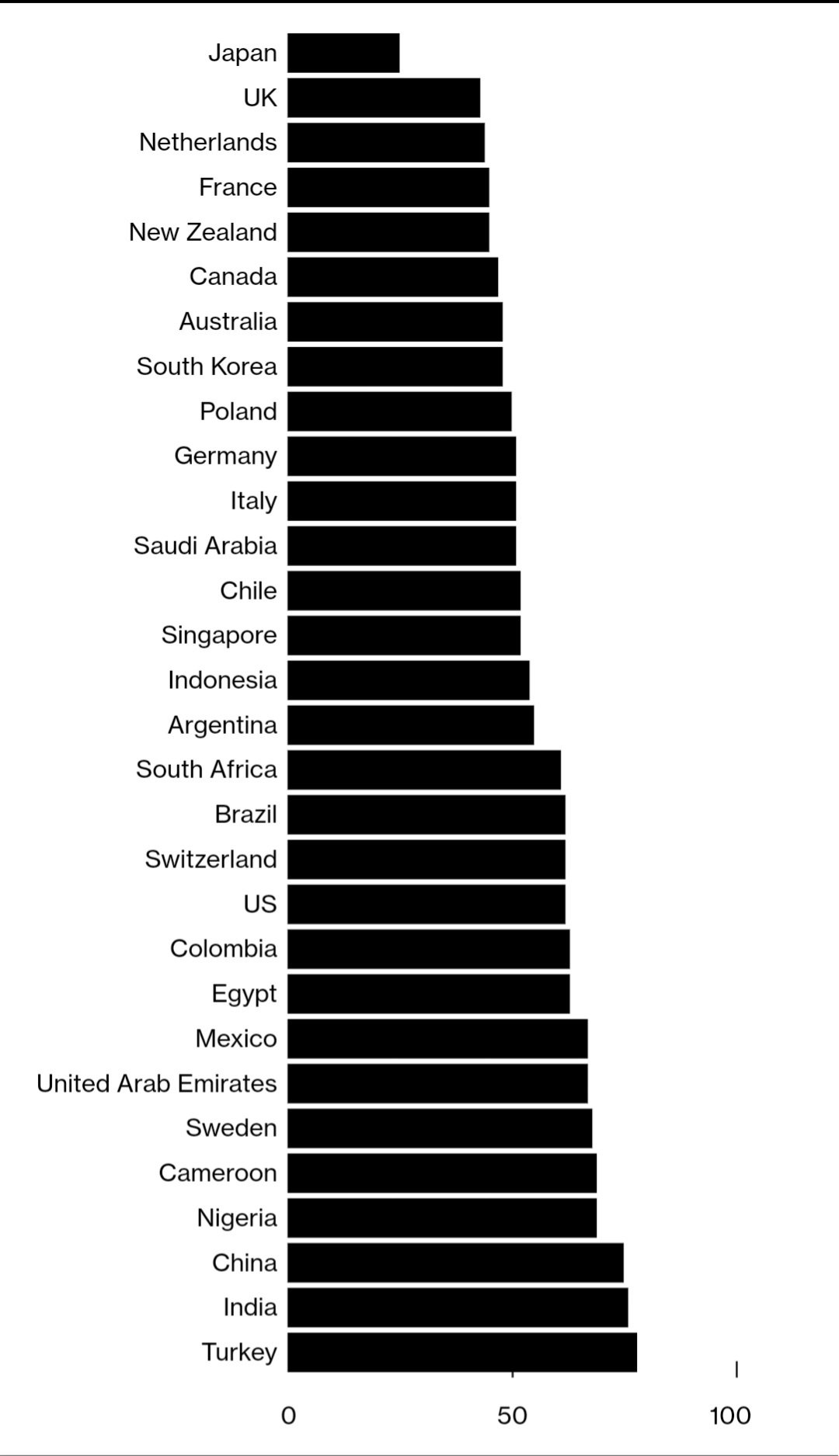Japan came in last in a global ranking of employees’ well being, measured by assessing physical, mental, social and spiritual health, the results of a survey conducted by McKinsey Health Institute showed.
This ranking is bonkers. Turkey, India, and China are in the top 3. The bottom 3 are Norway, UK, and finally Japan. Mexicans work some of the longest hours in the world, but has a ranking similar to Sweden. Norway and Sweden are some of the happiest countries in the world, with some of the strongest safety nets and worker protections. Why do their “employee well being” scores not reflect this? I don’t trust this ranking at all.
Edit: misread Netherlands for Norway. Still, the Netherlands actually ranks even higher on happiness than Norway, so my point stands.
deleted by creator
Yes this is not necessarily an academic study, and might just be something to guide corporations to maximize exploitative employment practices. These multiple factor experiments are also rife with the possibility for abuse. The research designers can tweak the weights, or operationalize concepts as they see fit.
deleted by creator
It’s a survey, so on top of people ranking themselves based on how they feel (democracies seemingly tending to say “could be a lot better”) you have autocracies drilling into their peoples heads to never shit talk the government or else. So of course you’ll end up with a ranking like this (on that note: did they also survey the Uyghurs in china or was forced labor taken out of the equation? Same goes for Saudi Arabia)
That is a possible explanation, but I don’t understand why these same errors don’t show up literally anywhere else. Shouldn’t Turkey, China, and India be in the running for happiest countries in the world too then? And why aren’t even more repressive autocratic countries ranked even higher? Is it really so hard to complain about healthcare access to a foreign pollster in India?
Norway isn’t in the study though? 🤨
Anyway as someone living in Norway, I can say that being one of the “happiest countries in the world” is very easy to achieve when a large percentage of the population has low standards from poor global exposure.
Working hours, worker protections and safety nets can be good indicators. While I don’t really trust McKinsey, I can say that “employee well-being” is more than these measures. In this survey, they looked at physical, mental, social and spiritual health. I’d guess that if Norway was included, they would actually do pretty badly.
Our health system - for both physical and mental health - is failing very badly (it’s also not free, not even all that cheap by the way.) I say this as someone who has used the system, have friends and family who have used it, and have friends working in both sectors. Immigrant friends and colleagues, some from third-world countries, return home when they need anything relating to health rather than rely on the local system. There is also a growing medical tourism industry, where people travel to places like Poland and Romania.
Social health is also probably low-ranking, especially for immigrant employees. Language and the culture of social exclusion by locals are large barriers to entry. A different survey has actually shown Norway ranking last in expat happiness/desirability.
Ultimately, all countries have their good and bad sides. I guess I just wanted to provide some insight into the misconceptions of Norway people generally have.
Thanks for the perspective. But all those problems you mention are much worse in other countries. Norway has some of the best health outcomes in the world. E.g. Every rich country practices medical tourism. In Canada, almost every province (except BC) is run by conservatives who have been cutting healthcare spending, even during the pandemic. It’s an actual crisis.
I did confuse Norway with the Netherlands, but on any objective measure, Norway is doing better on physical, social, and mental health than Turkey, India, and China! (I don’t even know how “spiritual health” would be measured. More bullshit it sounds like.)
There’s probably sampling bias going on because of who McKinsey has access to.
McKinsey’s offices in Turkey, India, and China tend to be in big tech/finance hubs (Beijing, Shanghai, Istanbul, Bengaluru, Mumbai) and, because of the scale of these countries, McKinsey rarely has to leave those contexts. I can absolutely believe that overall quality of life and satisfaction is better in those cities than in the West in aggregate. Beijing alone has a larger population than Sweden and Norway combined.
Having skimmed the study summary, I suspect that even more than sampling bias is research design shenanigans. There are a lot of new measures being introduced. They’ve somehow finessed the numbers so that India ranks high on “employee well being” despite having high levels of burnout, worse healthcare outcomes, and lower happiness than many other countries. The study repreatedly says that this new measure of “holistic health” is independent of those other factors.
I suspect that this is less about genuine scientific concern for “well being” and more about guiding businesses with their hiring decisions.
Are you allowed to complain? Is obviously the big factor.
This is Japan is worse to be an employee AND have the right to complain about. Being a slave does not count
I don’t know why you wouldn’t be able to complain to a pollster in India. I’ve seen other polling done in China that finds extreme dissatisfaction with the brutal 996 work culture. This ranking contradicts so many other data points.
Netherlands not Norway
Thanks. Misread that.
Out of the 30 countries they surveyed.
Behind the Bloomberg paywall:
Japan came in last in a global ranking of employees’ well being, measured by assessing physical, mental, social and spiritual health, the results of a survey conducted by McKinsey Health Institute showed. The island nation scored 25% in the poll of more than 30,000 workers across 30 countries, according to the study released on Thursday. Turkey was highest at 78%, followed by 76% for India and 75% for China. The global average was 57%.
(Graph in the article had no axis labels 🤷♀️)

Although Japanese businesses have built a reputation for offering lifetime employment and job security, it also means employees can find it hard to change jobs if they aren’t happy. Japan consistently has had low ratings in international surveys and the results reflect it, according to Rochelle Kopp, who advises companies on cross-cultural communications and business practices.
“There’s this documented tendency to rate yourself low,” said Kopp, who is also a board member of MS&AD Insurance Group Holdings Inc.“There are significant issues in Japan with lack of satisfaction in the workplace, with significant levels of stress.” At the same time, an increasing number of Japanese workers are on short-term contracts, fueling uncertainty, she added.
According to the McKinsey survey, employees who had positive work experiences reported better holistic health, are more innovative at work and show higher job performance.
“For most adults, the majority of waking daily life is spent at work,” the report’s authors wrote. “That offers employers an opportunity to influence their employees’ physical, mental, social, and spiritual health.”
Full McKinsey study here
Does anyone have an archive or something for this?
Also, genuinely surprised it is that low. I mean, I knew it was bad but fascinating.
Those aged 18 to 24 had the lowest holistic-health scores according to the survey. Managers scored higher than regular workers across the board.
deleted by creator
Turkey had the highest score, followed by India and China.
China 3rd? Hard to believe.
Tied for 2nd with India. I guess my comment wasn’t clear.
2nd or 3rd, hard to believe either way.
Why?








